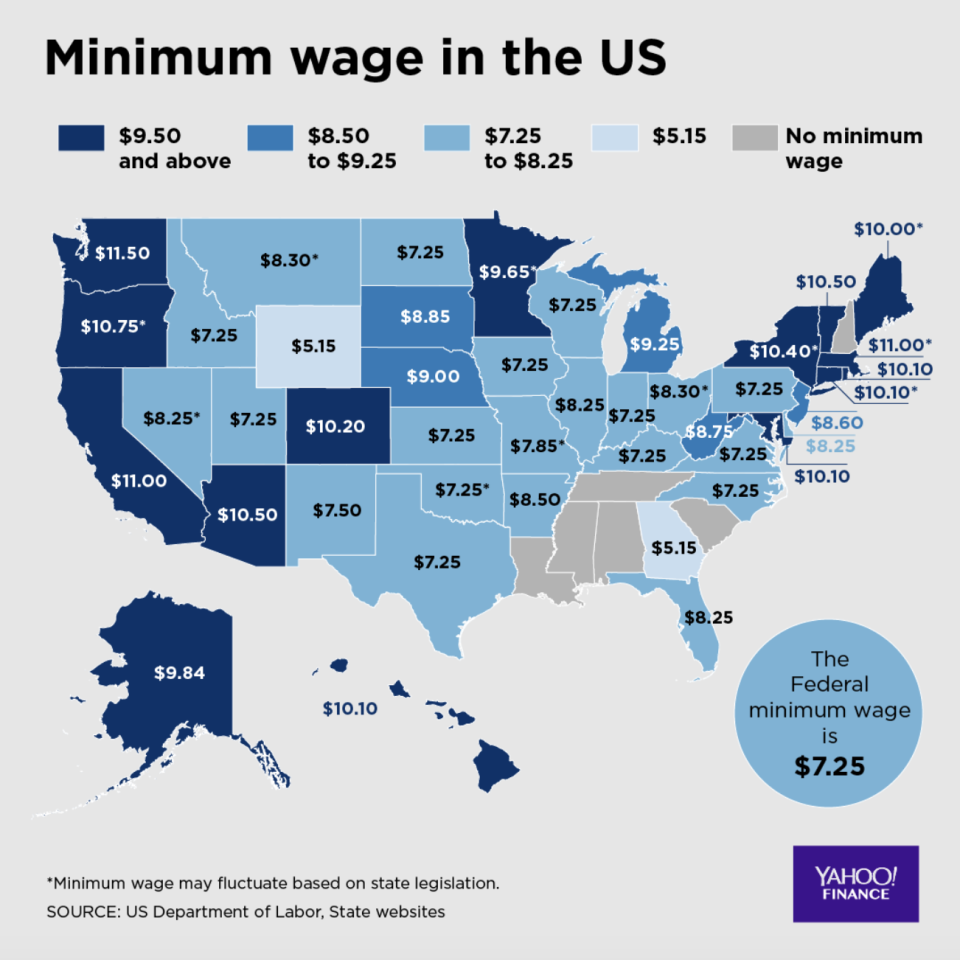$15 minimum wage would boost pay for 17 million workers, says CBO
A new report from the Congressional Budget Office (CBO) has evaluated the impact of raising the federal minimum wage to $15, $12, or $10 per hour by 2025. According to CBO estimates, raising the minimum wage to $15 an hour would boost the pay for 17 million workers. But, says CBO, it would also cause a median 1.3 million employees to lose their jobs as employers can’t afford the wage — that’s a 0.8% reduction of the number of employed workers.
CBO says that if the federal minimum wage were raised to $15 an hour, there is a 66% chance that between none and 3.7 million people could lose their jobs. However, the report states, “there is considerable uncertainty about the size of any option’s effect on employment.”
But those making less than $15 wouldn’t be the only ones impacted by a wage increase. So would those who earn just over $15 currently. According to CBO estimates, another 10 million workers would also see a boost in their pay from a raise in the minimum wage.
The report also found other benefits. According to the CBO’s analysis, 1.3 million people whose income was below the poverty line would see the wage jump over that threshold.
Raise the wage
The federal minimum wage currently sits at $7.25 an hour, and Congress hasn’t raised the wage for over a decade, the longest time in history. Since the minimum wage was created in 1938, it has been irregularly increased at the will of Congress. According to the Economic Policy Institute (EPI), the minimum wage has received a boost nine times since 1938. In the last 81 years, the minimum wage has increased from 25 cents to $7.25.
Currently, 29 states and D.C. have minimum wages above the federal minimum wage of $7.25 per hour.

A January poll found that 55% of registered voters said they would support raising the minimum wage to $15, and another 27% said it should be increased but to a lesser amount. The minimum wage increase examined by CBO is similar to the wage increase called for in the Raise the Wage Act of 2019, which would bump the minimum wage to $15 by 2024 and would be indexed to wage growth thereafter.
Raising the minimum wage has become a hot-button issue among policy makers and business leaders, with some big-name companies announcing increases. Presidential candidates Kamala Harris, Joe Biden, Bernie Sanders, Elizabeth Warren, Amy Klobuchar, Beto O’Rourke, Julian Castro and John Hickenlooper have all publicly declared to fight for a $15 minimum wage if they were to win the White House in 2020.
Though CBO’s report shows that some 27 million people would receive a boost in pay, EPI’s analysis shows that raising the federal minimum wage to $15 would boost the pay for roughly 40 million workers — more than a quarter of the wage-earning workforce.
While inflation levels are holding steady, the purchasing power of the current minimum wage has steadily eroded over the last decade. Since the minimum wage was raised to $7.25, its purchasing power has declined by 17%. That’s a loss of $3,000 in annual earnings for full-time minimum wage workers. Since reaching its buying power peak in 1968, the minimum wage has lost 31% in purchasing power. That means that effectively, minimum wage workers are “earning” more than $6,800 less than they would have in 1968 — when the minimum wage was only $1.60.
The negative impacts
Critics say that boosting the minimum wage would cause employees to lose their jobs. While the report acknowledges that upwards of 3.7 million people could lose their jobs, EPI says that raising the minimum wage would outweigh the costs. They also question whether so many people would be out of a job if the minimum wage was boosted to $15.
“More and more, economists are recognizing that simple, dated models of the economy that always predict job loss when the minimum wage is increased are based on assumptions that have little bearing on the low-wage labor market,” EPI said in a statement. “Well over 100 mainstream economists signed on to this letter in support of increasing the minimum wage to $15 in 2024. CBO’s assessment of the literature has simply not yet caught up.”
In the other two models — raising the wage to $12 and $10 — the report found that only 300,000 or 100,000 people would lose their jobs respectively.
The impact on the federal budget is even less clear. The CBO report says it has “not estimated how the options in this report would affect the federal budget.”
However, the report continues, it has estimated the impact of the Raise the Wage Act. In that analysis, CBO writes, “over the next 10 years, the bill would increase spending subject to annual appropriation acts by $76 million and would increase mandatory spending of the Postal Service by $1 million.”
Kristin Myers is a reporter at Yahoo Finance. Follow her on Twitter.
Read more:
Follow Yahoo Finance on Twitter, Facebook, Instagram, Flipboard, LinkedIn, YouTube, and reddit.
Read the latest financial and business news from Yahoo Finance

